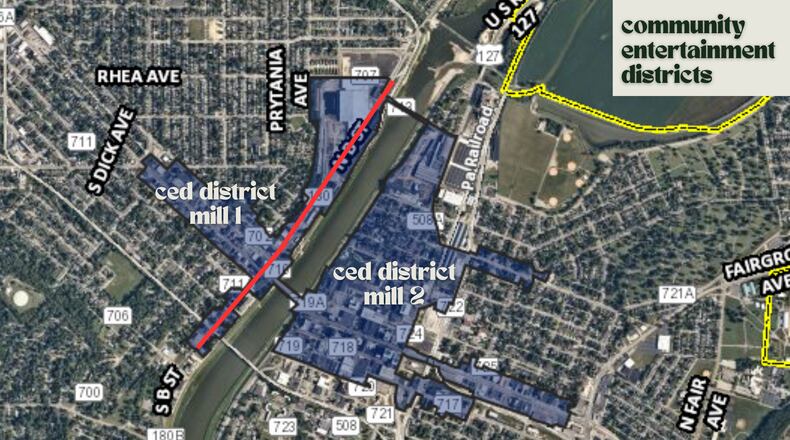If voters pass the two issues ― which are Issues 15 and 16 on the November ballot ― on the Nov. 7 general election ballot, businesses within those districts may focus on getting their measures passed instead of trying to find out which voters are within their precinct and asking enough people to sign a petition.
Establishments with an existing liquor license (D1 or D5) would still be required to file paperwork with the Butler County elections office to get the issue on a future ballot, but a sometimes daunting task for those not used to navigating political protocols would be eliminated.
While this impacts two designated areas in the city, the two issues will be on every Hamilton city ballot.
This voter-approved signature bypass process, however, is only permitted by Ohio law for businesses within a Community Entertainment District, which is a nuanced and complex process to create. Hamilton’s two districts were created several years ago and the primary two components in creating a CED include a minimum of a $50 million investment (it can be a single project or multiple projects) and an existing property owner must be petitioning for the creation of the district.
The Spooky Nook Sports Champion Mill development, which is bisected by North B Street, fulfills the $50 million investment requirement, separately taking each of the development’s buildings ― the sports complex and the hotel and conference center ― into account. A business owner along Main Street was the applicant in 2018.
City officials said the local option election process can be difficult for small business owners because of the multiple steps. Many have limited time and resources and need to pull voter registrations in a precinct from the county elections office. Then, they need to go door-to-door collecting signatures of registered voters on a petition (the number of signatures varies by precinct).
Once collected, the business owner submits petitions to the elections office. They would need more signatures than the minimum because, many times, signatures are not valid for various reasons.
After petitions are submitted, the county elections board evaluates the documents for certification consideration. If the petition is certified, business owners would have to run a campaign asking voters in the precinct to support their issue. If they’re rejected, they have to wait until the next election.
That process takes an owner’s limited time away from the business, according to supporters of the measure.
Tyler McCleary, general manager at Tano Bistro, said they have a D6 Sunday sales license at the Riverfront Plaza restaurant, and it’s “a complete game changer.” Over the summer, crowds from Spooky Nook made Sundays their third-busiest day, and as a result, they needed to hire more staff.
The boundaries of the CEDs ― which are considered economic development tools ― mimic the existing Designated Outdoor Refreshment Area (DORA), which allows off-premises consumption of alcohol. The DORA boundaries would overlay any future CED that would be established, city officials said. The city’s two existing CEDs include part or all of areas like German Village, the Central Business District, Heaton Avenue, Maple Avenue, East High Street, and the Main Street business district.
Those businesses outside the designated area are not eligible for the signature bypass process. However, city officials have said they could create another CED as there are developments planned that could qualify.
Voter info
Voter registration: Those who are not registered to vote can do so until Oct. 10 by going online at VoteOhio.gov or visiting the county board of elections office. Also, registered voters can update their voter information, including registration status or a change of address.
Early voting: Early voting begins on Oct. 11. Voters can cast in-office ballots at the Butler County Board of Elections, 1802 Princeton Road, Hamilton. They can also request a vote-by-mail absentee ballot by downloading a form from VoteOhio.gov or contacting the county elections office at 513-887-3700. Vote-by-mail ballots must be postmarked by Nov. 6.
Early voting times: There are four weeks of in-person early voting in Ohio. Here are the times and dates:
- 8 a.m. to 5 p.m. Oct. 11 to Oct. 13, Oct. 16 to Oct. 20, and Oct. 23 to Oct. 27
- 7:30 a.m. to 7:30 p.m. on Oct. 30
- 7:30 a.m. to 8:30 p.m. on Oct. 31
- 7:30 a.m. to 7:30 p.m. Nov. 1 to 3
- 8 a.m. to 4 p.m. on Nov. 4
- 1 to 5 p.m. on Nov. 5
Election Day: Election Day is Nov. 7, and polls will be open from 6:30 a.m. to 7:30 p.m. Voters who did not mail back any vote-by-mail absentee ballots may drop them off at the county elections office on Princeton Road. Polling locations cannot accept vote-by-mail ballots.
About the Author


